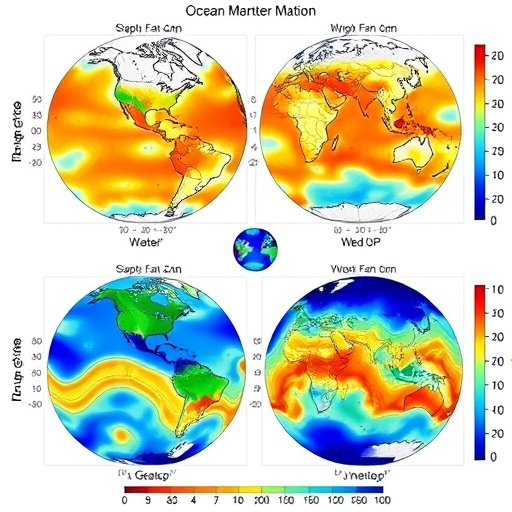The Arabian Sea, known for its rich marine biodiversity, has become a focal point for researchers aiming to understand the dynamics of phytoplankton communities, especially in the context of ocean warming. A recent study by Garg, Gauns, and Mohanty et al. meticulously examines the variations in subsurface phytoplankton dynamics within this vital region. Their research sheds light on how these critical organisms respond to elevated light intensities exacerbated by climate change, an aspect that could influence entire marine ecosystems.
Phytoplankton serve as the foundational component of marine food webs, being primary producers that convert sunlight into energy through photosynthesis. This process not only supports their growth but also drives the productivity of larger marine organisms, from zooplankton to the largest marine mammals. Phytoplankton populations thrive in varying light conditions, but as global temperatures rise, so do concerns about the shifting thresholds and optimal conditions for these producers.
In the North Eastern Arabian Sea, distinct seasonal patterns of light intensity and nutrient availability play crucial roles in the determinism of phytoplankton dynamics. The study reveals that varying depths and the interplay of light penetration significantly impact how these communities structure themselves. Understanding the intricate relationships between light and phytoplankton can provide insight into future productivity trends and food web stability in a warming ocean.
As temperatures increase, it’s not merely the average temperature that is concerning but the frequency of light intensity spikes as well. With climate change, extreme weather events can lead to variations in sea surface temperatures and consequently affect the subsurface temperature, which poses a direct challenge to the survival of various phytoplankton species. The study emphasizes the significance of this phenomenon in shaping community structures at different depths.
The researchers conducted extensive field sampling to quantify the phytoplankton population and analyze its composition during elevated light conditions. Utilizing advanced microscopy techniques and molecular tools, they were able to identify specific species most sensitive to changes in light intensity. This analysis provided a comprehensive view of how phytoplankton vary in their acclimatization and adaptation processes under changing environmental conditions.
One of the pivotal findings of the research indicates that certain species are resilient and capable of thriving under elevated light conditions, often competing more effectively than others. This competitive advantage could lead to shifts in community composition, favoring species that are better adapted to survive in high-light environments, ultimately altering the entire food web structure in the North Eastern Arabian Sea.
Moreover, the implications of these shifts are far-reaching, impacting not just marine life but also associated human activities such as fishing and coastal management. The researchers highlight that a decline in species diversity could make entire ecosystems more vulnerable to diseases, invasive species, and further environmental changes.
Furthermore, the broader implications for food security cannot be overlooked, especially for coastal communities that rely heavily on diverse fish stocks supported by a range of phytoplankton types. If specific phytoplankton species dominate and the biodiversity decreases, the overall health and productivity of the marine ecosystem could diminish. This situation could translate to lower yield and income for fishing communities, affecting livelihoods and food security.
Interestingly, the research does not merely document the challenges but also emphasizes the resilience shown by some phytoplankton species. The adaptability of these primary producers can offer hope in the face of climate challenges. This adaptability highlights the potential for certain ecological niches to be leveraged for restoration or enhanced productivity of marine resources.
The findings of this research urge for a more integrated approach to marine resource management, incorporating ecological insights to devise strategies that can mitigate the impacts of climate change. Effective management practices should aim at maintaining biodiversity while also ensuring that resources are harvested sustainably to support local economies.
Equally important, the study opens avenues for future research on how other marine organisms, particularly those higher up the food chain, respond to shifts in phytoplankton dynamics. Investigating the potential cascading effects on marine ecosystems will be crucial for forming a holistic understanding of ocean health.
In an era marked by climate uncertainty, the research by Garg et al. signifies a remarkable step in enhancing scientific knowledge regarding marine phytoplankton. Their work serves as a compelling reminder of the need to continually monitor and study our oceans, as subtle shifts in phytoplankton dynamics can have drastically broader implications for marine ecosystems and human societies alike.
As the scientific community engages with this timely research, the overarching hope is to foster an interdisciplinary dialogue that bridges marine biology, climate science, and resource management. Addressing the challenges posed by ocean warming will require collaborative strategies and proactive measures to ensure the resilience of crucial marine ecosystems.
In summary, the study of phytoplankton dynamics in the North Eastern Arabian Sea underlines not only the complexity of marine ecosystems in the face of climate change but also the urgent need for comprehensive monitoring and adaptive management strategies to safeguard these vital oceanic inhabitants.
Subject of Research: Subsurface phytoplankton community dynamics in the North Eastern Arabian Sea.
Article Title: Subsurface phytoplankton community dynamics in the North Eastern Arabian Sea and their response to elevated light intensities under ocean warming scenario.
Article References:
Garg, S., Gauns, M., Mohanty, F. et al. Subsurface phytoplankton community dynamics in the North Eastern Arabian Sea and their response to elevated light intensities under ocean warming scenario. Environ Monit Assess 197, 1280 (2025). https://doi.org/10.1007/s10661-025-14589-z
Image Credits: AI Generated
DOI:
Keywords: Phytoplankton dynamics, Arabian Sea, climate change, elevated light intensity, marine ecosystems.




